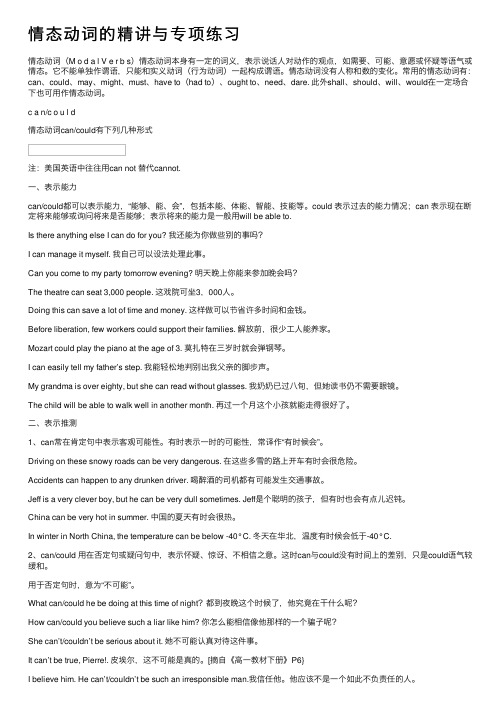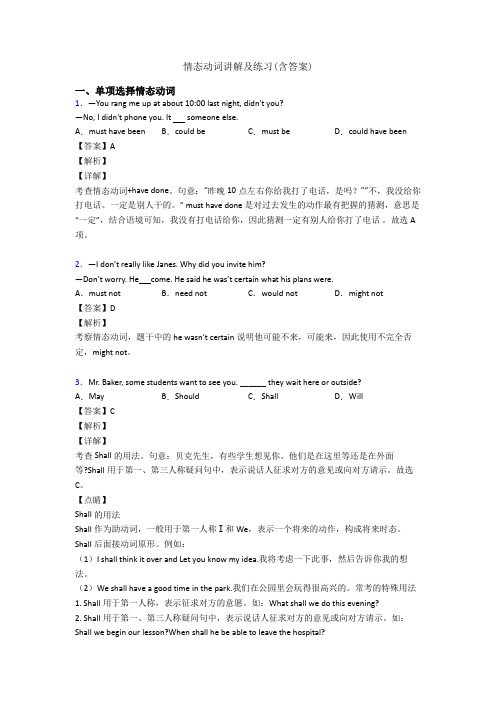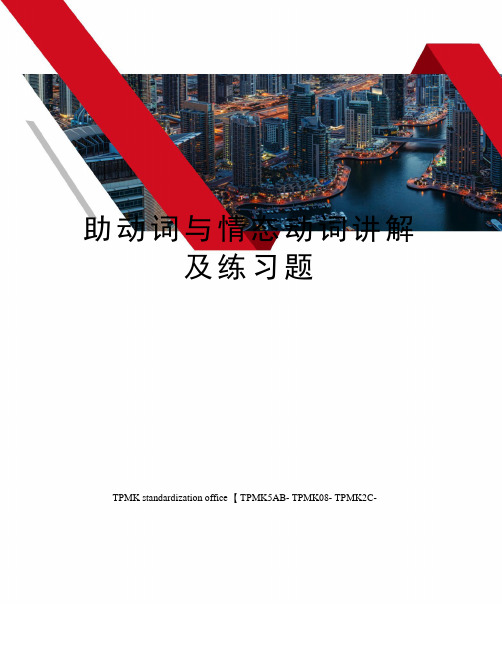情态动词讲解与练习
情态动词的精讲与专项练习

情态动词的精讲与专项练习情态动词(M o d a l V e r b s)情态动词本⾝有⼀定的词义,表⽰说话⼈对动作的观点,如需要、可能、意愿或怀疑等语⽓或情态。
它不能单独作谓语,只能和实义动词(⾏为动词)⼀起构成谓语。
情态动词没有⼈称和数的变化。
常⽤的情态动词有:can、could、may、might、must、have to(had to)、ought to、need、dare. 此外shall、should、will、would在⼀定场合下也可⽤作情态动词。
c a n/c o u l d情态动词can/could有下列⼏种形式注:美国英语中往往⽤can not 替代cannot.⼀、表⽰能⼒can/could都可以表⽰能⼒,“能够、能、会”,包括本能、体能、智能、技能等。
could 表⽰过去的能⼒情况;can 表⽰现在断定将来能够或询问将来是否能够;表⽰将来的能⼒是⼀般⽤will be able to.Is there anything else I can do for you? 我还能为你做些别的事吗?I can manage it myself. 我⾃⼰可以设法处理此事。
Can you come to my party tomorrow evening? 明天晚上你能来参加晚会吗?The theatre can seat 3,000 people. 这戏院可坐3,000⼈。
Doing this can save a lot of time and money. 这样做可以节省许多时间和⾦钱。
Before liberation, few workers could support their families. 解放前,很少⼯⼈能养家。
Mozart could play the piano at the age of 3. 莫扎特在三岁时就会弹钢琴。
I can easily tell my father’s step. 我能轻松地判别出我⽗亲的脚步声。
小学情态动词的句型转换讲解及练习

小学情态动词的句型转换讲解及练习情态动词是英语语法中的一个重要组成部分,是文章中用于表达推测、猜测、建议等含义的动词。
小学阶段是英语语言研究的重要时期,因此了解情态动词的正确使用十分必要。
什么是情态动词情态动词是一种助动词,常常用于表示某种能力、必要性、愿望、推测等情况。
动词本身表示的是动作或状态,而情态动词则表示说话人的态度或语气。
常见的情态动词有:- can- could- may- might- must- shall- should- will- would情态动词的句型转换在句子中,情态动词的位置可以变化,因此我们可以利用这一点来进行句型的转换。
以下是一些常见的情态动词句型转换:1. 直述句→ 疑问句直述句:They can swim.疑问句:Can they swim?2. 直述句→ 否定句直述句:He should finish his homework.否定句:He should not finish his homework.3. 直述句→ 疑问句+否定句直述句:You may eat the cake.疑问句+否定句:May you not eat the cake?现在我们来做一些练,更好地掌握情态动词的句型转换。
练题1. 直述句:They can play the guitar.疑问句:否定句:2. 直述句:She should go to bed early.疑问句+否定句:3. 直述句:I will finish my homework tomorrow.否定句:疑问句+否定句:练答案1. 直述句:They can play the guitar.疑问句:Can they play the guitar?否定句:They cannot play the guitar.2. 直述句:She should go to bed early.疑问句+否定句:Shouldn't she go to bed early?3. 直述句:I will finish my homework tomorrow.否定句:I will not finish my homework tomorrow.疑问句+否定句:Won't I finish my homework tomorrow?以上是小学情态动词的句型转换讲解及练习,希望能对您有所帮助。
情态动词小结及练习

情态动词小结及练习情态动词有:can(could),may(might),must,have to(had to),shall(should),will(would,need, dare, ought to等。
一.情态动词can, may, must用法(一)基本用法1. can(1) 会,能够--Can you swim?--Yes, I can.--No, I can’t.(2) 口语中代替may。
You can (may) park here. 你可以把车停在这里。
(许可) 2. may允许,许可--May I come in?--Yes, you may./Sure, come on in.-- No, you mustn’t.No, you can’t. (见练习16)No, you’d better not.3. must必须--Must we finish the exercise today?--Yes, you must.-- No, you needn’t.No, you don’t have to.4. need 需要,必需--Need you go now?= -- Must you go now?--Yes, I must. --Yes, I must.--No, I needn’t. --No, I needn’t.(注:need作为情态动词,通常用在否定句和疑问句中)注意一:can 与be able to 都可以表示“能力”。
区别是:(1)can只有现在和过去两种形式,即can和could。
I can play the piano.She couldn’t play the piano when she was a little girl.(2)be able to①有更多的形式和时态。
We shall/will be able to finish the work next week.I haven’t been able to find the book.②指具体一次活动。
情态动词讲解及练习(含答案)

情态动词讲解及练习(含答案)一、单项选择情态动词1.—You rang me up at about 10:00 last night, didn't you?—No, I didn't phone you. It someone else.A.must have been B.could be C.must be D.could have been 【答案】A【解析】【详解】考查情态动词+have done。
句意:“昨晚10点左右你给我打了电话,是吗?”“不,我没给你打电话。
一定是别人干的。
” must have done 是对过去发生的动作最有把握的猜测,意思是“一定”,结合语境可知,我没有打电话给你,因此猜测一定有别人给你打了电话。
故选A 项。
2.—I don’t really like Janes. Why did you invite him?—Don’t worry. He come. He said he was’t certain what his plans were.A.must not B.need not C.would not D.might not【答案】D【解析】考察情态动词,题干中的he wasn’t certain说明他可能不来,可能来,因此使用不完全否定,might not。
3.Mr. Baker, some students want to see you. ______ they wait here or outside?A.May B.Should C.Shall D.Will【答案】C【解析】【详解】考查Shall的用法。
句意:贝克先生,有些学生想见你。
他们是在这里等还是在外面等?Shall用于第一、第三人称疑问句中,表示说话人征求对方的意见或向对方请示。
故选C。
【点睛】Shall的用法Shall作为助动词,一般用于第一人称Ⅰ和We,表示一个将来的动作,构成将来时态。
助动词与情态动词讲解及练习题

助动词与情态动词讲解及练习题TPMK standardization office【 TPMK5AB- TPMK08- TPMK2C-助动词与情态动词一、助动词助动词有be, have, do, will, shall。
它们本身没有词义,只和实义动词的一定形式构成复合谓语,用来表示时态和语态,构成否定、疑问及加强语气等。
1、be (am, is, are, were, been)(l)“be + -ing”构成进行时态;(2)“be + 过去分词”构成被动语态;(3)“be + 动词不定式”构成复合谓语:①表按计划安排要发生的事。
The prime minister is to visit Japan next year.总理将于明年访问日本。
②用于命令。
You're to do your homework before you watch TV.你得做完了作业才能看电视。
2、have (has, had)(1)“have+过去分词”构成完成时态。
如:Have you seen the film(2)“have been + -ing”构成完成进行时态。
如:What have you been doing these days 这些日子你一直在干什么?3、do (does, did)(1)“do not + 动词原形”构成行为动词的否定式。
如:His brotherdoesn’t like playing basket.;(2)“Do + 主语 + 动词原形”构成行为动词的一般疑问句。
Does he go toschool by bike every day (3)“do + 动词原形”用于祈使句或陈述句中表示加强语气。
如:I did go to see him, but he wasn’t in我确实去看望他了,但他不在家。
Do do some work. 请一定做点什么;(4)代替前面刚出现的动词以避免重复。
初一情态动词讲解及练习附答案

(could), may (might), must, have to, shall (should, will (would), dare (dared), need (needed), ought to等。
情态动词无人称和数的变化;不能单独使用,必须与其后的动词原形构成谓语一、can, could1) 表示能力(体力、知识、技能)。
Can you lift this heavy box?(体力)Mary can speak three languages.(知识)Can you skate?(技能)此时可用be able to代替。
Can只有一般现在时和一般过去式;而be able to则有更多的时态。
I’ll not be able to come this afternoon.当表示“经过努力才得以做成功某事”时应用be able to,不能用Can。
如:He was able to go to the party yesterday evening in spite of the heavy rain.2) 表示请求和允许。
-----Can I go now? ----- Yes, you can. / No, you can’t. 此时可与may互换。
在疑问句中还可用could, might代替,不是过去式,只是语气更委婉,不能用于肯定句和答语中。
---- Could I come to see you tomorrow? ---- Yes, you can. ( No, I’m afraid not. )3) 表示客观可能性(客观原因形成的能力)。
They’ve changed the timetable, so we can go by bus instead. This hall can hold 500 people at least.4) 表示推测(惊讶、怀疑、不相信的态度),用于疑问句、否定句和感叹句中。
高中英语 情态动词讲解和练习
情态动词情态动词是表达说话者的感情和语气的动词,它们的一个显著特点是不能单独使用,必须与实义动词的原形共同使用构成整个句子的谓语部分。
常用的情态动词罗列如下:Shall/should = ought to, will/would, may/might, can/could, must。
Need/dare 这两词既可以作情态动词,同时也可以作实义动词,我们称其为半情态动词。
1. shall:(1)征询对方意见或请示对方,多用于第一或第三人称的疑问句中。
如:Let’s go out for a walk, shall we?Shall he come in or stay outside? 让他进来还是在外面呆着?(2)说话者含有警告,命令, 承诺或者威胁的语气,多用于第二或第三人称。
如:You shan’t leave until six o’clock. 你不到六点不准离开。
No one shall stop me from speaking out the truth. 没有人能阻拦我说出真话。
What you have done now shall be paid for one day. 你今天所做的一切总有一天要偿还的。
(3)用在法律条约等文件中,表示义务,规定。
如:Each citizen shall carry his identification card when traveling.2.should(1) 等于ought to 表示应该。
如:You should wear school uniforms when you are at school.(2) Should 还可表示“居然”,说明说话者的惊讶和不理解。
如:It’s strange that he should have passed the driving test. 真奇怪,他居然通过驾驶考了。
(3) 可表示推断。
情态动词与虚拟语气讲解及练习题
情态动词与虚拟语气四川省达州市第一中学张国龙一. 含义和特征1. 含义: 情态动词是表示情态意义的动词, 它表示说话人的语气和情态, 它不能单独作谓语, 必须与实义动词一起构成谓语, 情态动词没有人称和数的变化。
2. 特征: ①有词义但不完整, 不能单独作谓语, 要跟实意动词或系动词的原形作谓语。
②除have to外, 可适用于各种人称和数。
③有些情态动词有过去式。
二. 基本用法1. can/ could和be able to ①can/ could表示能力, 这时could 为can 的过去时。
I can climb the cliff. He can drive a car. We could sing the song when I was young. ②表示许可。
You can sit here. The plane can take off now. 在疑问句中could比can委婉, 回答用can。
Can/ Could I come here tomorrow? Yes, you can. ③表示“有时候可能会”。
Even an experienced teacher can make a mistake. To stay here could be better. ④表示说话人的推测、怀疑、惊异、猜测、不肯定或不耐烦等,主要用于否定句, 疑问句或感叹句中。
The story can’t be true. How could you be so careless! Where can he go? ⑤cannot…too/ enough意为无论怎么…也不过分, 越…越好。
You cannot be too careful. You cannot remember enough English words.⑥can和be able to都表示能力, 意思上没多大区别。
can只有can和could两种形式, 而be able to则有am/ is/ are/ was/ were able to, will/ shall be able to, have/ has/ had been able to等形式。
小学英语情态动词讲解和练习
Can I use your pen? Yes, here it is. Can you help me? Yes, I can.
我能用一下你的钢笔吗? 当然,给你。 你能帮帮我吗? 是的,当然。
Did you know? When you put not after can, you write it as one word: cannot. Learn these contractions: cannot= can’t Some birds cannot(can’t )fly.
2. 表示可能性时,常用在肯定句中,意为“可能,也许” He may be very busy now. 他现在可能很忙。 He said that she may not be at work today. 他说她今天也许不上班。
3. Can 和 may 都可以表示推测。can 通常用在否定句和疑问句中,may 通常用在肯定句和否定句中。 虽然两者都可以用于否定句,但是程度不同,can’t 的语气比may not 更强。
A. can B. may C. must
II. Read and write.
1. You _____c__a__n_________ (can) borrow my book, if you want. 2. They’ve lost the map and ___c__a__n___n___o__t__ (can) find their way back to the hotel. 3. May I go out to play now? No, you ___m___a___y___n__o__t________(may). 4. If you want to be healthy, you __m___u___s__t__n___o__t_____ (must) eat junk food. 5. You ___m___u___s__t__________ (must) believe yourself.
小升初英语情态动词专题讲解及练习
小升初英语必考点情态动词:情态动词有词义,但它不能单独作谓语,它必须和其他动词一起构成谓语。
情态动词没有人称和数的变化;它的后面必须跟动词原形。
一、情态动词的种类:情态动词有can (could), must, have to, shall (should), will (would)等,这些是小学阶段需掌握的情态动词。
二、情态动词的用法:注意:can not=can’t could not=couldn’t1) 表示能力(体力、知识、技能)。
I can sing.我会唱歌。
He can draw pictures.他会画画。
2) 表示请求和允许。
Could \Can you help me? 你能帮助我吗?---- Yes, of course.\Certainly.\ Sure.Could \Can you tell me the way to the Zoo? 你能告诉我去动物园的路吗?1) must表示必须、必要, 带有命令强制口气;而have to表示不得不,很勉强,强调客观需要。
We must help each other.我们必须互相帮助。
My sister is ill,I have to look after her.我的妹妹病了,我必须要照顾她。
注意:must的否定形式mustn’t表示禁止,意思是“不能,不许”。
在回答由must引起的疑问句时,如果是否定的,不能用mustn’t(禁止,不准),而用needn’t, don’t have to(不必要)。
— Must I do homework now ?—肯定:Yes, you must.否定:No, you don’t have to / you needn’t.应该”,表示劝告、建议等。
注意:should not=shouldn'tI should finish my homework before watching TV.我应该看电视之前完成作业。
- 1、下载文档前请自行甄别文档内容的完整性,平台不提供额外的编辑、内容补充、找答案等附加服务。
- 2、"仅部分预览"的文档,不可在线预览部分如存在完整性等问题,可反馈申请退款(可完整预览的文档不适用该条件!)。
- 3、如文档侵犯您的权益,请联系客服反馈,我们会尽快为您处理(人工客服工作时间:9:00-18:30)。
高中英语情态动词用法归纳与练习A: can / could = be able to1 表示能力两种时态can (could),其他时态要用be able to的形式He can speak French.Was/were able to 可以表示成功做成某事的含义* managed to do / succeeded in doing With our help, he was able to build the house.2 表示请求或许可Could 比Can 更加客气* mayCan I go now? Yes, you can.3 表示推测或可能性,常用于否定句和疑问句Can he be at school?Today is Sunday. He can't be at school.Can’t couldn’t/ Can ? Could? have doneThere is no light in the room. Can she have gone to bed?She can’t have gone to school----- it’s Sunday.Could have done 可用在肯定句中表示过去存在的可能性* may have doneShe could have gone out with some friends yesterday.Could have done 可以表示虚拟语气某事可能发生(并没有发生)It was silly to throw the TV out of the window. It could have hit somebody.批评某人没有完成某事(本可以做某事)You are late again. You could have got up earlier.4 can 表示客观上的可能性*Anybody can make mistakes.B: may and might1 表示请求和允许类似用法can could(更加口语化)May I watch TV now? Yes, you may.2 表示可能性; 猜测might比may更加不确定may/might have done 对过去的揣测* He may be busy these days.May not 可能不;不可能;一定不可3 表示祝愿Wish you success!May you succeed!*C: must and have to1 表示必须;一定要可以用have to 代替must 现在;将来的必须而且是主观看法*have to 有多种时态而且强调客观情况I really must stop smoking now.I had to leave early because I wasn’t feeling well.Must I come here?Yes, you must. No, you needn’t. needn’t / don’t have to must not 一定不能做某事mustn’t 2 must 表示推测意思非常肯定“一定是”“一定会”It must be raining outside.Must have done 对过去/完成的推测* must have done, didn’t / hasn’tMust be doing 推测现在正在进行He must have gone over the article, hasn’t he?It must have rained last night, didn’t it?D: need and dare 过去时 dared情态动词和实意动词的区别A 人称变化B do / to doC 直接否定/ 间接否定can workNeed /dare 肯定句中,实义动词She needs to do it. I dare to do it.使用在否定句,疑问句中,情态动词,实义动词。
I dare not do it. I don’t dare (to) do it.I need not do it. I don’t need to do it.1 need 情态动词无时态;人称的变化多用于疑问句和否定句You needn’t try to explain.Needn’t = don’t have toNeedn’t have done sth 过去本不必做某事* 虚拟语气2 need 实义动词有时态;人称的变化后接to do You need to tell us the truth. The car needs repairing. The car needs to be repaired.3 dare 情态动词过去时dared 无人称的变化多用在疑问句和否定句Dare he tell them what he knows?4 dare 实义动词有时态;人称的变化后接to do用于疑问句和否定句时其后的to 有时可省略Do you dare (to) jump off the high wall?E: will and would1 表示征求对方(第二人称)意见或询问对方意愿would 比will 更客气委婉Will you have some more wine?Would you mind my smoking here?2 will 表示习惯性动作或某种倾向would 表示过去习惯性动作或某种倾向Fish will die out of water.When I was young, I would play badminton on Sundays.Would 与used to 的区别*Would 只能用来表示重复的动作而不能表示状态Used to 既可表示动作也可表示状态, 强调现在不如此He used to be a university student.3 will 表示意愿决心I will never do that again.F: shall, should and ought to1 shall 在问句中表示征求对方意见或请求用于第一,三人称What shall we do now?2 shall 肯定句中表示说话人强烈的感情允许,命令,禁止和威胁*或表示按规定,规章和义务等用于第二,三人称If you dare to do that, you shall be punished.These rules shall be obeyed.Shall not 禁止,不许3 shall 决心,意愿= willI shall come if I want to.4 should 表示劝告,建议= ought to 应该You should wash your hands first.Should 主要表示主观看法*Ought to 客观情况法律、规定、义务的使用Should have done / ought to have done sth 虚拟语气*Shouldn’t have done / ought not to have done sthYou should have done it today.5 should 推测推论可能性= ought to *估计They should/ ought to be there by now.6 should说话人的感情。
如惊奇、愤怒、失望等、“竟然”否定句疑问句You can’t imagine that well-behaved gentleman should be so rude to a ladyWhy should he do such a thing?推测肯定性可能性由强到弱must / shall* / ought to / should / would* / could* / may / might /can 理论上的可能/ can? Could? / can’t couldn’tmust 用于表示"必定","必会":All mankind must die.(表示必然会发生的事)所有的人一定会死的。
shall用于表示"必定":I shall be rich one day. (shall be )总有一天我发达的。
ought to / should用于表示"想必会"(语气较must 弱):They should / ought to be there by now.他们想必已到那儿了。
will 和would 用于表示"预测"或"习惯性":I think he will be all right now. (will be 表示一定会)我想他现在一定好了。
Could 表推测No, but the shop could be in the east of the city.may 和might 用于表示"事实上的可能性"或"预测":It may snow later this afternoon. (表示预测)今天下午可能会下雪。
You might be right. (表示有可能)你可能是对的。
Can理论上的可能Anybody can make mistakes. (只表示理论上的可能性)任何人都可能犯错误。
Can? Could? / can’t couldn’t 疑问否定He can't be at home. (否定句)他不可能在家。
Can the news be true ? (将情态动词can 置于主语the news 前就成疑问句)这消息可能是真的吗?情态动词be doing情态动词have donemust / could / may / might / Can; could? have done / can’t ; couldn’t have done请求和允许Can could I; he /may might I; he / will would you / shall should ought to I; he? / Must I? 不同类型语气分析Can I go with you ? (请求)我能跟你一起走吗?Could I ask you something ? (请求,用could 比can 更婉转)我可以问你一件事吗?May I make a suggestion ?我可以提个建议吗?Might I take a look of your work ?我看看您的大作行吗?Will you kindly tell me the way to the post office ?(表示客气请求)请问到邮局怎么走?Would you give me your address ? (用would 比will 表示更客气)请你告诉我你的地址,好吗?Shall we talk?我们谈谈好吗?What should we do next ? (用should 比shall 表示更客气)下一步我们该怎么做?Shall he come to see you ? (用于第三人称疑问句)要不要他来看你?Must I finish the work right now?Must I pay now ? (用于疑问句) (如回答不必时,需用needn't 或don't have to)我现在就得付款吗?情态动词的用法:表示“应该”、“必须”命令和建议(Must, have to , Shall, ought to, Should, May*, Might*,)Must 用于表示“必须”、“务必”:You must keep the place clean. (务必)你务必保持地方干净。
